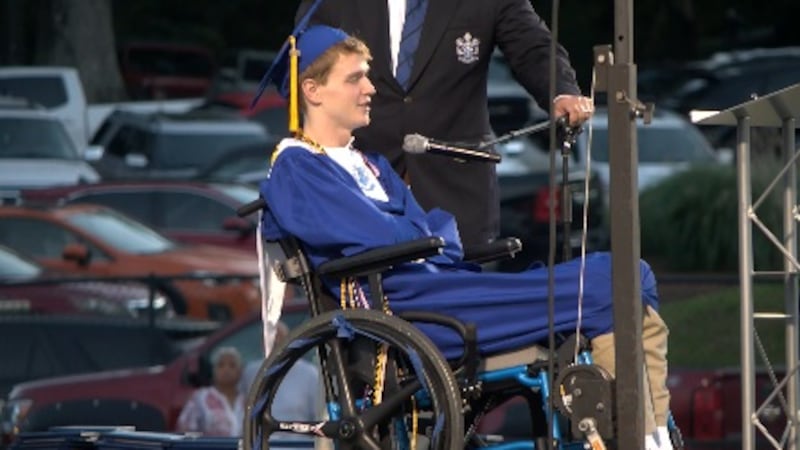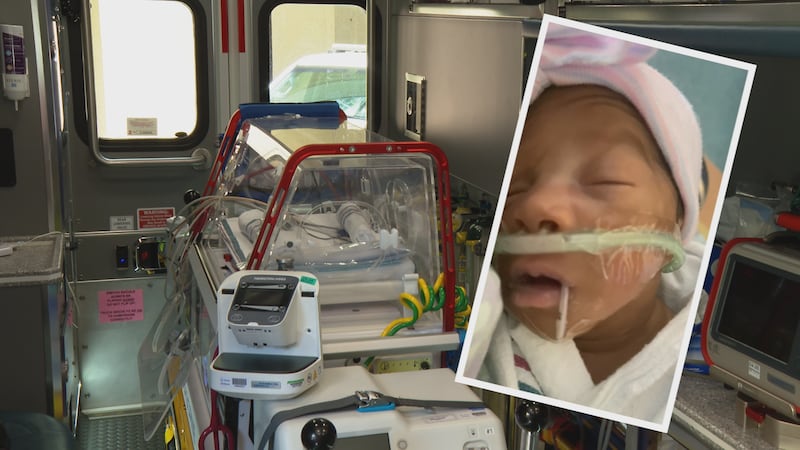High-profile GSP crash raises questions about pursuit policies
AUGUSTA, Ga. (WRDW/WAGT) - We’re looking into the rules about high-speed police chases after one ended with a Georgia State Patrol vehicle slamming into the entrance sign at News 12.
And it all began with a case of speeding.
No suspect was ever caught in the late Saturday chase that began on Washington Road and ended about a mile north at 1226 Gray Way.
But the trooper lost control of his vehicle on a curve after speeding north from Washington Road on Alexander Drive. The car drove over a curb and into a concrete wall and erupted in flames. The car and sign were heavily damaged, but injuries to the trooper, Tyler Crowe, were minor.
MORE FROM NEWS 12:
But this could have been a much different story.
Just a few feet on the other side of the sign is the parking lot of a Dave & Busters that does booming business. And across the street is a brand-new Olive Garden that’s been packed every night since opening Dec. 4.
Was the pursuit justified, considering the risks involved?
A report recently released by the federal government strongly urges law enforcement agencies to reduce high-speed chases.
The U.S. Department of Justice report suggests pursuits should only take place when an officer is aware a violent crime has been committed or when the suspect poses an imminent threat to commit another violent crime.
The Georgia State Patrol’s current pursuit policy is discretionary and mostly lets troopers decide when to launch a high-speed chase.
GSP doesn’t limit pursuits to violent crimes.
It was a traffic violation that sparked Saturday night’s chase. The trooper took off after a Mustang was traveling 81 mph in a 45 mph zone on Washington Road, according to GSP.
According to annual reports produced by the Georgia Department of Public Safety, which oversees GSP, pursuits have increased over the past five years. That includes at least 1,673 GSP pursuits last year alone.
And according to the U.S. Department of Transportation’s National Center for Statistics and Analysis, pursuits that turned deadly increased 41% from 2001 to 2021.
During that period, 8,203 people died; 493 of those were from Georgia. Of those killed nationally, about 36% were innocent bystanders.
And there was plenty of potential for bystanders along the route of Saturday night’s chase.
Numerous restaurants and other businesses are busy late on that stretch of Washington Road, which may be Augusta’s busiest street.
The Mustang and the patrol vehicle were apparently traveling west on Washington, because GSP public information officer Franka Young said the chase took a right turn onto Alexander Drive.
Alexander Drive between Washington and Riverwatch Parkway is lined with apartments, condos and homes.
As the trooper neared Riverwatch Parkway – where Alexander becomes Cabela Drive – he began to lose control on a curve, according to Young.
Had the crash not happened where it did, the potential for danger could have been higher.
Georgia law states officers should consider several factors when pursuing a chase, including the nature of the offense committed by the suspect, the potential danger to the public if the suspect is not immediately apprehended. This is all according to Georgia Department of Public Safety’s policy manual.
Cabela Drive is a burgeoning entertainment and commercial area. Beyond Dave & Busters and Olive Garden at the entrance, smaller eateries and Costco line the road as it progresses to the rear anchors of Riverwatch Cinemas, Topgolf and Bass Pro Shops.
According to the Georgia Peace Officer Standards and Training Council, Crowe received four hours of training last year in “pursuit liability and due regard.”
Reducing the danger
The federal study urges agencies to write policies that will cut the number of high-speed pursuits.
“It’s not that we’re saying don’t ever pursue,” said Chuck Wexler, executive director of the Police Executive Research Forum, which helped develop the report. “We’re saying, if you’re going to pursue, make sure that it is for the right reasons.”
Wexler said police need discretion, but they also need parameters to determine under what circumstances law enforcement should participate in high-speed chases.
“This, in many ways, this is about the sanctity of human life and how you train police officers and how you supervise police officers,” said Wexler.
Recommendations include banning pursuits involving feeling motorcyclists; requiring supervisor approval to continue chases and only allowing officers with pursuit training to engage in chases.
The report also addressed myths associated with strict pursuit policies. For example, it referenced whether or not people only flee from police when they have committed a serious crime.
The answer, according to the report: “Research shows more than 90 percent of pursuits are initiated because of traffic violations.”
Andy Pierrotti of Atlanta News First contributed to this report.
Copyright 2023 WRDW/WAGT. All rights reserved.















